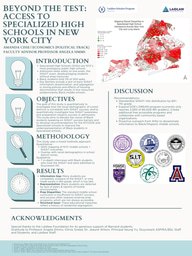My Past Impact: Higher Ed in NYC
My research on educational access even more prevalent to me after I was accepted to Stuyvesant High School, one of NYC’s top 8 public schools called the “Specialized High School.” Stuyvesant has almost 4,000 students with only 10 black students accepted each year: a statistic announced yearly in the New York Times. We made up around 1% of Stuyvesant’s population, and early on I observed my friends in the Black Students League struggle with culture shock as hurtful comments in the classroom drove them to tears on a regular basis. As president of the Black Student League and as someone who had to overcome the same feelings of isolation growing up, I wanted to make Stuyvesant a more inclusive space along with other Specialized High Schools. The extreme lack of information and resources about the Specialized High Schools for Black and Brown communities has had devastating effects on the number of students admitted to these schools and has created even more hostile environments within them.
I am most proud of spearheading my school’s “Respect for All” advisory class to teach all Stuyvesant freshmen to have respectful conversations around race, bias, and identity. I recruited around 90 students to help present lessons that she created about foundational concepts such as implicit bias, stereotyping, and avoiding slur usage. Each class also has a twenty minute discussion where freshmen engage in respectful dialogue surrounding their feelings and experiences related to race. Over three years at Stuyvesant, these lessons have reached 2,490 freshmen, and will continue annually after I have left.
I was awarded the Princeton Prize in Race Relations for this initiative, along with other inclusivity work in my community such as my role as the New York City Department of Education's Diversity, Equity and Inclusion representative, and as Black Student’s League President. As the NYC Department of Education DEI representative, I presented DEI progress annually at citywide NYC DOE conferences, and led regular meetings to update and support the Specialized High School Black and Hispanic parent group.
I have also conducted personal research on this topic during my junior year, using an instagram account with 1.7K followers called @blackatspecialized, I interviewed 30 students, collected over 120 anonymous stories, and surveyed 200 students. I used this data to write a research report on the Black experience at Stuyvesant: https://stuyspec.com/article/blackatspecialized-how-can-we-address-stuyvesant-high-school-s-race-problem. As a result of this Op-Ed, Stuyvesant’s Principal also invited me to create and present the first ever student-led professional development lesson for 180+ staff. The lesson focused on race in the classroom. It resulted in a number of changes including teachers updating syllabi, reaching out personally to Black and Hispanic students, adding new units to their curricula, and sharing the presentation with other schools. There was also an increase in staff “professional development effectiveness” ratings.
I am so grateful for the opportunity that Laidlaw provides to continue working to change this issue. After graduating, I refuse to be a bystander to this glaring problem. I feel an even stronger urge to do what I can to make the changes that I want to see for myself and so many around me that have been affected by the same problems. With Laidlaw, I am proud and honored to be doing what I can to improve the communities that I am surrounded with while also growing and creating connections with other strong women who are like minded and have something that they are really passionate about changing in this world.

Please sign in
If you are a registered user on Laidlaw Scholars Network, please sign in